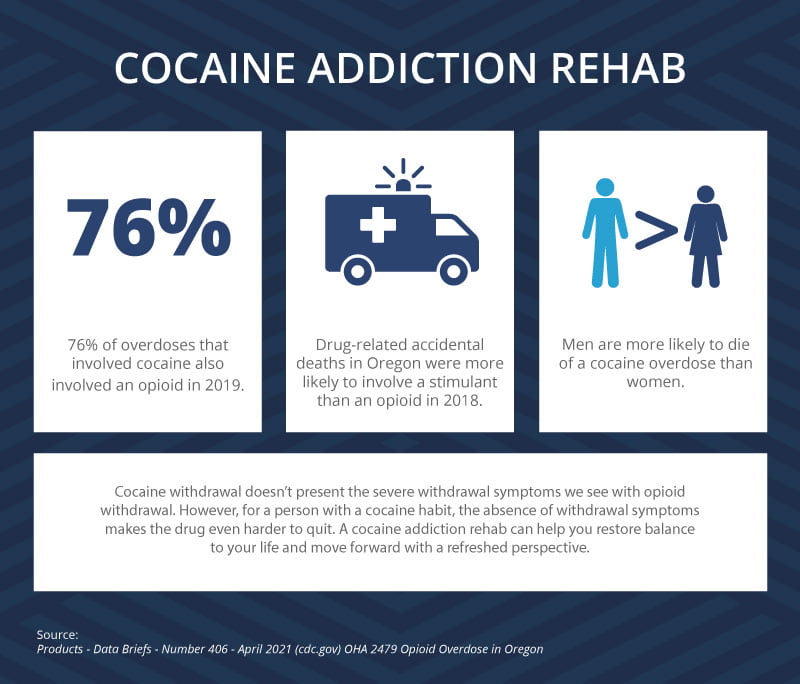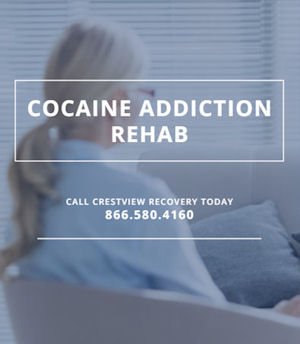
Healing Begins Here
HISTORY OF COCAINE
SIDE EFFECTS OF COCAINE USE
There are several short-term side effects of cocaine use. Cocaine increases heart rate, pulse, and blood pressure. While that may not pose a threat to some, it can cause severe problems for people with existing cardiac conditions. Cocaine consumption also disturbs sleep for at least 24 hours after consumption. It may also cause erratic or violent behavior. Cocaine use also causes digestive problems and severe insomnia. In extreme cases, it can also lead to hallucinations or seizures.
Prolonged cocaine consumption causes the side effects of cocaine use to intensify. Permanent damage to the cardiovascular system is possible. A decrease in appetite can lead to unhealthy weight loss as well as malnutrition. Depression, anxiety, and other mood or personality disorders can appear or worsen with cocaine abuse and addiction. Cocaine also causes dental and nasal problems when used long-term.

SIGNS OF COCAINE ADDICTION
Cocaine users might also display substantial mood swings. Alternating periods of lethargy and hyperactivity could be a sign of reliance on cocaine. If you or a loved one is exhibiting any of the above signs, it’s time to find a cocaine treatment program.
COCAINE WITHDRAWAL
Psychological addiction to cocaine is often the hardest part to overcome, but the physical symptoms can also be difficult. Frequent cocaine users develop a dependence on it, meaning they need to have it in order to feel high and feel normal. Once dependence has developed, an increased tolerance will happen. When they try and stop, severe withdrawal symptoms will occur.
Understanding the cocaine withdrawal timeline is critical, as withdrawal typically involves both psychological and physical symptoms that can lead to relapse if not managed professionally. Once someone becomes addicted to cocaine, it is very hard to stop. This is mainly because of the abnormal levels of dopamine in the brain caused by drug use. This abuse eventually reprograms the brain’s reward system. Without professional help, an individual’s life is at risk. If you may have a cocaine addiction, the earlier you can treat this dangerous addiction, the better. The professional addiction treatment specialists at Crestview can help you safely and comfortably move forward in your recovery and in your life.
HOW DOES COCAINE ADDICTION START?
Cocaine may seem attractive to some because it is a stimulant that produces effects of euphoria and alertness similar to caffeine. But it’s not comparable at all to drinking a few cups of strong coffee. Cocaine is addictive, expensive, and dangerous. Over time, cocaine negatively affects every part of the body, with the potential for severe long-term effects. It can cause changes to genetics in brain cells, nerve cells, and proteins, among other permanent damage.


IS MY LOVED ONE ADDICTED TO COCAINE?
- Pupils that are frequently dilated
- A constantly runny nose and frequent sniffling
- Complaints of headaches, stomach pain, or nausea
- Tremors
- Increased heart rate
- Impotence
- Increased paranoia
- Lack of appetite
- Mood swings and irritability
- Increased anxiety
- Unexplained bursts of energy
- Insomnia or hypersomnia
- Poor judgment
- Hallucinations
COCAINE ADDICTION TREATMENT OPTIONS
- Residential treatment program
- Partial hospitalization program (PHP)
- Intensive outpatient program (IOP)
- Outpatient program
We also offer a variety of therapeutic programs to help you on your recovery journey, including:
Individual therapy types include cognitive-behavioral therapy (CBT), dialectical behavior therapy (DBT), motivational interviewing, and interactive journaling, among many other techniques.
In group therapy, you will interact with individuals who have had similar experiences and have similar sobriety goals to yours.
Begin the work of rebuilding your relationships with your family alongside you.
The first responder program is specially designed to treat addiction issues in first responders.

MEDICAL & PSYCHIATRIC ADDICTION TREATMENT
COCAINE ADDICTION TREATMENT IN PORTLAND
- Men’s drug rehab program
- Women’s drug rehab program
- Individual therapy program
- Group therapy program
- Dual diagnosis therapy
- Trauma therapy program
After you or a loved one struggles with a cocaine addiction, a drug treatment program can help. At Crestview Recovery in Portland, Oregon, each member of our treatment team is committed to helping people achieve their goals and live a life that isn’t dominated by drugs and alcohol. Reach out to our team to start making positive life changes today.






















